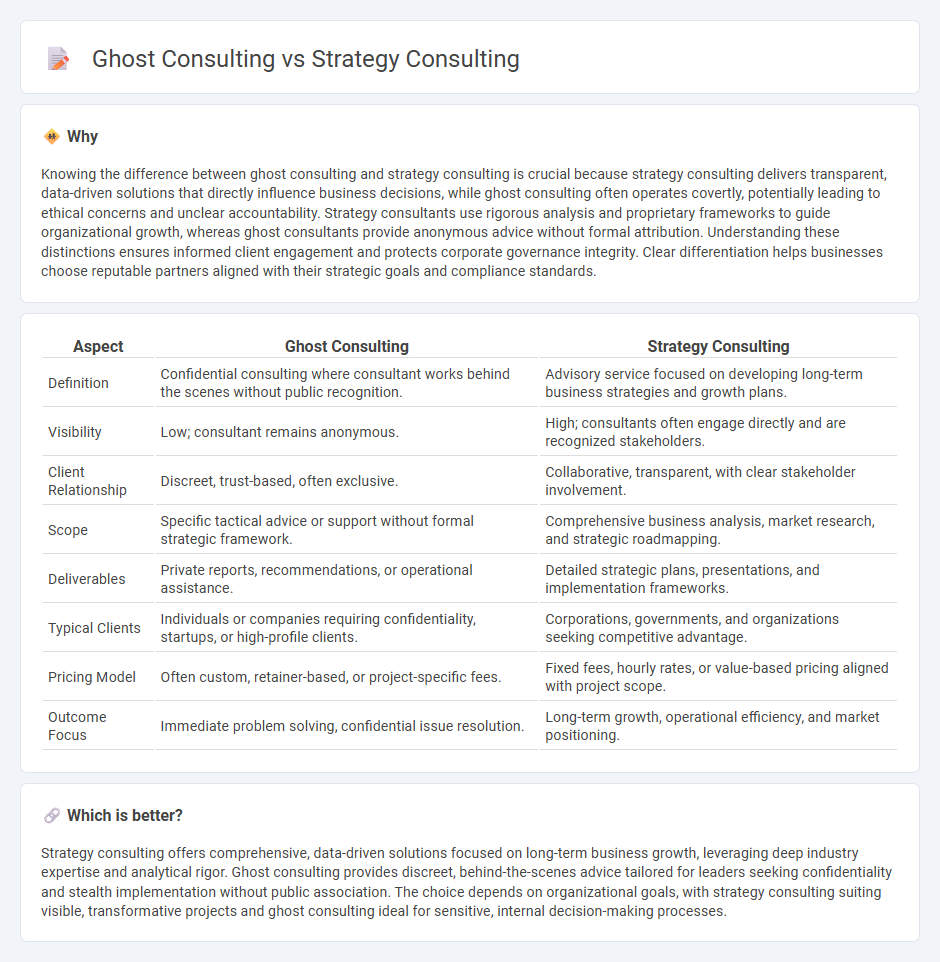
Ghost consulting involves advisors working behind the scenes to provide expert guidance without direct client interaction, focusing on confidential support and implementation. Strategy consulting, on the other hand, emphasizes high-level problem-solving and long-term planning, collaborating closely with clients to drive organizational growth and competitive advantage. Explore the distinctions between ghost consulting and strategy consulting to understand which approach best suits your business needs.
Why it is important
Knowing the difference between ghost consulting and strategy consulting is crucial because strategy consulting delivers transparent, data-driven solutions that directly influence business decisions, while ghost consulting often operates covertly, potentially leading to ethical concerns and unclear accountability. Strategy consultants use rigorous analysis and proprietary frameworks to guide organizational growth, whereas ghost consultants provide anonymous advice without formal attribution. Understanding these distinctions ensures informed client engagement and protects corporate governance integrity. Clear differentiation helps businesses choose reputable partners aligned with their strategic goals and compliance standards.
Comparison Table
| Aspect | Ghost Consulting | Strategy Consulting |
|---|---|---|
| Definition | Confidential consulting where consultant works behind the scenes without public recognition. | Advisory service focused on developing long-term business strategies and growth plans. |
| Visibility | Low; consultant remains anonymous. | High; consultants often engage directly and are recognized stakeholders. |
| Client Relationship | Discreet, trust-based, often exclusive. | Collaborative, transparent, with clear stakeholder involvement. |
| Scope | Specific tactical advice or support without formal strategic framework. | Comprehensive business analysis, market research, and strategic roadmapping. |
| Deliverables | Private reports, recommendations, or operational assistance. | Detailed strategic plans, presentations, and implementation frameworks. |
| Typical Clients | Individuals or companies requiring confidentiality, startups, or high-profile clients. | Corporations, governments, and organizations seeking competitive advantage. |
| Pricing Model | Often custom, retainer-based, or project-specific fees. | Fixed fees, hourly rates, or value-based pricing aligned with project scope. |
| Outcome Focus | Immediate problem solving, confidential issue resolution. | Long-term growth, operational efficiency, and market positioning. |
Which is better?
Strategy consulting offers comprehensive, data-driven solutions focused on long-term business growth, leveraging deep industry expertise and analytical rigor. Ghost consulting provides discreet, behind-the-scenes advice tailored for leaders seeking confidentiality and stealth implementation without public association. The choice depends on organizational goals, with strategy consulting suiting visible, transformative projects and ghost consulting ideal for sensitive, internal decision-making processes.
Connection
Ghost consulting and strategy consulting intersect through their focus on providing expert advice to organizations aiming to improve business performance and achieve strategic goals. Ghost consultants often operate behind the scenes, offering specialized insights and actionable strategies that support the broader objectives defined in strategy consulting frameworks. Both approaches emphasize data-driven analysis, competitive market assessment, and tailored solution development to drive sustainable growth.
Key Terms
Competitive Analysis
Strategy consulting specializes in in-depth competitive analysis by leveraging market research, customer insights, and competitor benchmarking to develop actionable business strategies. Ghost consulting provides similar competitive insights but operates anonymously, allowing businesses to benefit from expert analysis without external attribution or public exposure. Explore the distinctions between these approaches to optimize your competitive strategy.
Client Representation
Strategy consulting specializes in providing expert advice to organizations for improving business performance, focusing on data-driven analysis and strategic planning to solve complex challenges. Ghost consulting emphasizes discreet client representation by acting behind the scenes to influence negotiations, stakeholder communications, and decision-making processes without direct attribution. Discover the key differences and benefits of each approach to enhance your consulting strategy proficiency.
Confidentiality
Strategy consulting emphasizes delivering structured business solutions with transparency and client collaboration, while ghost consulting prioritizes absolute confidentiality by operating anonymously and often behind the scenes. Confidentiality in ghost consulting ensures sensitive strategic initiatives remain undisclosed, protecting company interests without revealing the consultant's involvement. Discover how confidentiality impacts decision-making and project execution in both consulting approaches.
Source and External Links
What Is Strategy Consulting? (With Goals and Skills) | Indeed.com - Strategy consulting is a form of management consulting where experts provide strategic planning advice to businesses to optimize profitability and operations, serving industry leaders, non-profits, governments, and investors.
Strategy Consulting | Consultancy-me.com - Strategy consulting supports private sector clients and governments by developing corporate, organizational, or functional strategies and involves advising senior executives on high-level decisions including market entry, M&A, and business model shifts.
What Is Strategy Consulting? - Duke Career Hub - Strategy consulting entails advising companies on crucial business decisions through research, analysis, and recommendations across areas like corporate strategy, digital strategy, M&A, and business model transformation, typically working with C-suite executives.
 dowidth.com
dowidth.com